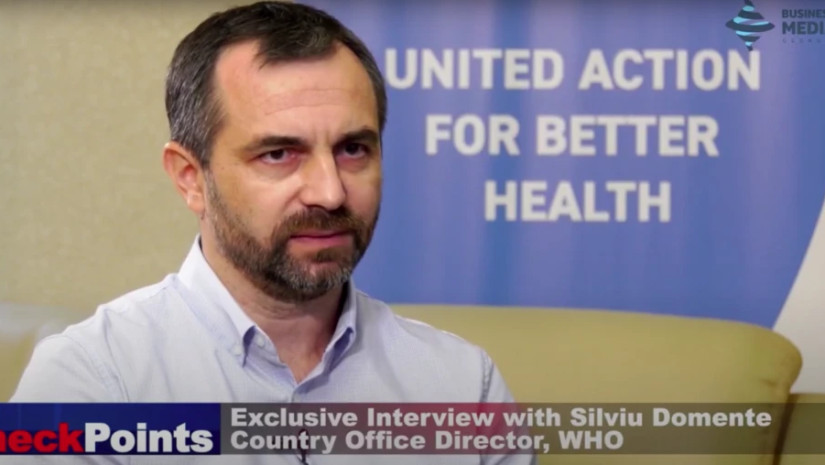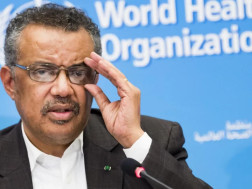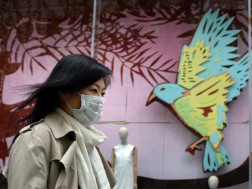56% of respondents cost of medicine is the biggest issue facing Georgia’s healthcare system today – shows the recent NDI Poll which was fielded by the Caucasus Resource Research Centers (CRRC) for NDI between July 13 and July 25 with the financial assistance of the UK Aid, and was carried out through nationwide mobile phone interviews (excluding occupied territories) with 2,016 respondents and has an average margin of error plus, minus 1.3%. According to the poll, 25% named the cost of medical care as the biggest issue facing Georgia’s healthcare system and 18% said COVID-19 related issues create the biggest issues.
On 4 August 2021, The Checkpoints ran the exclusive interview with the WHO Country Office Director Silviu Domente, touching upon the recent recommendation for Georgia to regulate the prices of the medicine to decrease out-of-pocket payments and boost the financial protection of the population. The Checkpoints attempted to get more information on how WHO sees achieving this goal and whether or not there are risks that might result in creating a deficit on the market.
Elene KVANCHILASHVILI: What are some structural problems that the WHO sees in Georgia’s healthcare system and is advising the government on?
Silviu DOMENTE: The WHO is actively promoting the principle of universal health coverage, and when we say universal health coverage to put it simply it means that people need to have access to the medical services in the volume that they need, at the time they need, at the place they need. Those services should be of high quality, and the most important is that people should not experience financial hardship from accessing these services and people should not get impoverished from accessing health services. These are the main principles and the whole structure and the whole organization of healthcare should follow these goals:
People need to have access to services that they need; those services should be of high quality and people should not experience financial hardship. So that’s why we looked particularly at this aspect of financial hardship because it is very important since it is usually caused by out-of-pocket payments. People have to pay for services out of pocket in addition to what the state can cover for them. When out-of-pocket payments are very high, this can lead to so-called catastrophic payments for health services and to impoverishing expenditures for health services.
So, evidence shows that the low the state allocations for the health sector, the higher out-of-pocket payments. Unfortunately, Georgia still allocates quite a modest amount of health. This has increased of course and you know that since 2013, Georgia introduces a universal healthcare program – so, the state allocations for health have increased significantly. This has led to improving the access to health services: From 20% of people accessing health services in Georgia, now almost everybody has access through this universal healthcare program.
Elene KVANCHILASHVILI: But if we look at the last 6 years, there hasn’t been a year when universal healthcare doesn’t need additional funds from the budget. It is always breaching the threshold that it has in the budget.
Silviu DOMENTE: This is exactly my point because Georgia has increased the budgetary allocation for healthcare but they are still very low. Now, this is around 2.8% of GDP paid for health, while in the whole European region the average is 4.9% almost 5%, and when I say European region, it is not EU but the European region of WHO is 53 member states including former Soviet Union, Central Asia and so on. And if we look into the EU then, this is around 7% budgetary allocations that go to health. So, these allocations in Georgia in that sense are very modest. Surely, Georgia allocates less for health among the countries that allocate the least on health. This is of course a concern and for few years we are promoting increasing these budgetary allocations for health. It’s important, but simply increasing these allocations is not enough.
Elene KVANCHILASHVILI: Exactly. This was my next question to you: Quantity does not always mean quality, right?
Silviu DOMENTE: Yes, it will not solve all the problems, because it is important how you allocate, where you allocate those services, and how you design these services because whatever you allocate, there will always be co-payments for different services. No country in Europe now can fully cover -100% of the services. There are always co-payments. There are always out-of-pocket payments. But it depends on how high these out-of-pocket payments are, and what is the impact on the household budget. This is the problem, because when the out-of-pocket payments are low and when they don’t have a strong, severe impact on the household budget – they are fine, they are acceptable and in most of the countries, these out-of-pocket payments are around 15%, maximum to 30% which we in the WHO considers as the threshold. In Georgia, these out-of-pocket payments reached 48% now, which is again one of the highest in the region and this is of course an issue of concern. We did this study and we saw that despite this universal healthcare program, despite increased allocations and increased access to services, still, out-of-pocket payments have increased: The share of the out-of-the-pocket payments in the household budget has increased from 7 to 9%. So, people pay more out of pocket for services. On the other hand, 7% of the households have these impoverishing payments and 17% catastrophic payments for the household budget. This is an issue of concern.
Elene KVANCHILASHVILI: And the biggest share of these out-of-pocket payments is on medicine, right? And this is the reason why you focused your attention on regulating the prices…
Silviu DOMENTE: That’s right. When we look at those catastrophic payments almost 70% of those out-of-pocket-payments they go for medicine. And if we divide the population in quintiles, the poorest quintile pays even more – the poorest quintile pays almost 90%, in the richest quintile it’s much less -24%.
Elene KVANCHILASHVILI: Speaking of Georgia’s context when we see that the majority of the medicine is imported into the country, the first thing that comes to my mind is even more liberalization of imports of medicine to boost the competition and lower prices. But I haven’t read anything like that in the last report of the WHO. You are stressing about regulating prices directly. Why’s that choice and how will that work?
Silviu DOMENTE: This is a good practice all over the world and in the whole region – so, the evidence shows that when people regulate better the pharmaceutical market the prices of medicine, this leads to better financial protection because, at the end of the day, this leads to better prices on medicine; this leads to the better quality of the medicine; and many other aspects. So here it’s not only price regulation alone –of course, price regulation is very important, and here in Georgia I must say prices are not regulated; they are liberal as you mentioned – but this doesn’t help to reduce them because Georgia is a small market and it’s not always possible. Then Georgia is a country that is using increasingly brand names and the generics are very low quantities on the market and they are not popular both among doctors and the population. So, this is another issue. Then there is the issue of the quality of medicine, quality assurance, but then also how people get reimbursement for the medicine – all these schemes how much people get reimbursed from the medicine that is prescribed: In different countries, we have different schemes. This is also another issue - it’s not only about prices but also many other aspects, I want to mention this. The first thing we recommend is of course to have a framework, legislation – new legislation in the area of pharmaceuticals that will open the possibilities to better regulate prices, to better regulate quality, access to medicine, and so on. And the second direction is how to reimburse this medicine and what medicine to include in the package of services to be reimbursed by the state.
Elene KVANCHILASHVILI: So that they are included in the universal healthcare program right? We remember this pledge from the government but then it turned out, it was quite costly.
Silviu DOMENTE: And here we have to look at the burden of the disease because in Georgia most diseases are non-communicable diseases which mean that we have to include in the package of services more medicine for chronic diseases – like hypertension, for diabetes, for asthma, etc. And this is a very important step and then how to reimburse – because for the time being there is a percentage payment for the medicine that people have to pay now out of pocket and there is no cap on how much to pay out of pocket during the year, so there are no limits. There is a need to regulate the volume of services provided; prescription of medicine and so on – it’s very complex.
Elene KVANCHILASHVILI: It sounds complex. But what might be some unintended consequences of this regulation –has the WHO thought about that, too? For example, if caps are on medicine prices that are imported and if Lari depreciates (which is a quite frequent case in Georgia); then there might be no motivation for the business to bring in some medicine, which might mean a deficit on the market. No cheap, no expensive medicine – None.
Silviu DOMENTE: These are the usual arguments of the pharma industry. There is some truth in that. In some cases, some big pharmaceutical companies can withdraw from the market but the practice has shown that there is never an empty place on the market – if any producer withdraws from the market, somebody else will come. This is for sure. We have seen this everywhere. It all depends again on the state and how all this is regulated.
















